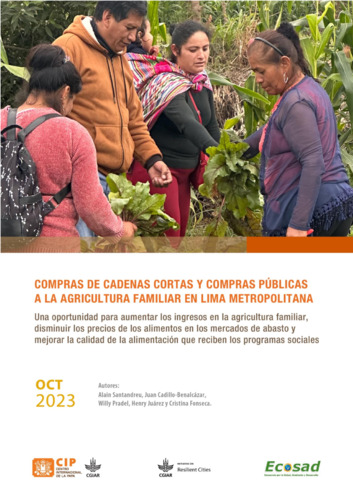Compras de cadenas cortas y compras públicas a la agricultura familiar en Lima Metropolitana. Una oportunidad para aumentar los ingresos en la agricultura familiar, disminuir los precios de los alimentos en los mercados de abasto y mejorar la calidad de la alimentación que reciben los programas sociales
Abstract
Introduction
Metropolitan Lima, composed of 43 conurbated districts with the port of Callao, is the demographic and economic epicenter of Peru, housing 30% of the population and contributing 40% of the national Gross Domestic Product. Its food system faces significant challenges that must be addressed to ensure the right to food. Family farming plays an essential role, providing 70% of the agri-food products consumed in the country. However, these farmers face increasing levels of poverty, a lack of organization, and limited access to training and technical assistance. The main objective of this study is to analyze food purchases from family farmers in Metropolitan Lima, with a specific focus on short chains for supply markets and public purchases for social programs.
Methodology
The research adopted a collaborative approach, working closely with organizations such as the National Federation of Supply Market Workers (FENATM) and the Lima Network of Community Kitchens. Supply markets were selected in various areas of Lima, and surveys were conducted with 77 traders, along with semi-structured interviews involving 16 public and private organizations relevant to the city's food system. Digital tools like KoboToolbox and ATLAS.ti were used to support data collection. Workshops were also conducted with 44 community kitchen leaders to delve into their food needs. Furthermore, food self-sufficiency was assessed, and a healthy diet was analyzed, considering nutritional standards and associated costs.

